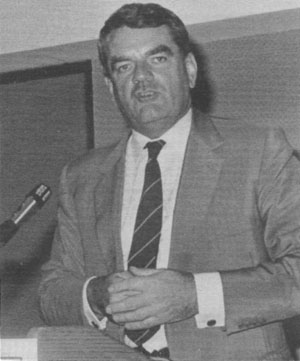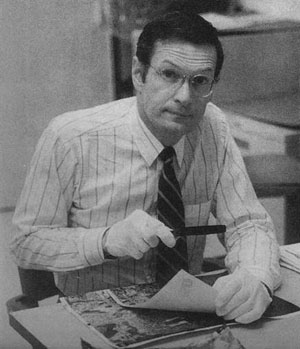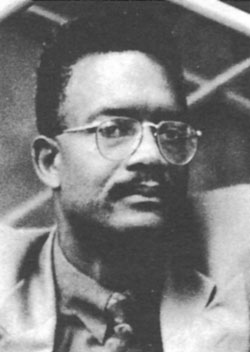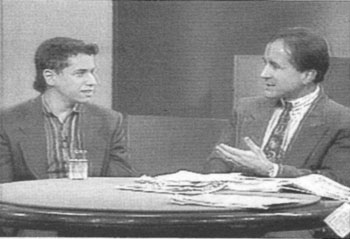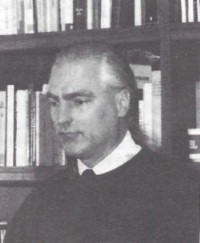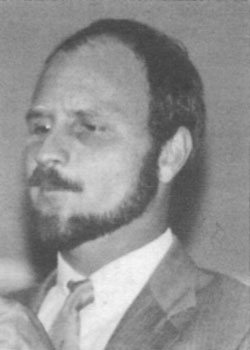Twelfth IHR Conference Set for September [1994]
Leading Revisionist Historians and Activists to Meet in Southern California over Labor Day Weekend
Scholars, activists and friends of the Institute for Historical Review are scheduled to meet over Labor Day weekend, September 3-5, in southern California for the IHR's Twelfth International Revisionist Conference. Highlighting the roster of speakers will be bestselling historian David Irving, French revisionist scholar Robert Faurisson, and German-Canadian revisionist activist Ernst Zündel.
Closer Cooperation
This forthcoming Conference highlights the ever closer cooperation between revisionist scholars, activists, publicists and supporters. No one better personifies this spirit than the German-born, Toronto-based Ernst Zündel. There's scarcely a revisionist who's accomplished as much – through his publishing efforts as chief of Samisdat Publishers; through his longtime media activism in Canada, Germany, and now, through his ambitious television and radio network, around the globe; and above all through his two trials in Toronto under Canada's repressive “false news” statute, which ended with Canada's highest court throwing out as unconstitutional the strange law under which he was twice convicted.
Zündel's two “Holocaust trials” (1985 and 1988) generated storms of publicity for the revisionist view, and brought breakthroughs for historical revisionism and free speech. In courageously choosing to defend himself by forthrightly attacking the historicity of the Holocaust story, Zündel organized a mountain of evidence and expert testimony. Much of this was presented for the first time at his trials, including that of Fred Leuchter (whose forensic study of the Auschwitz “gas chambers” was commissioned by Zündel).
Zündel's appearance at an IHR conference has been long awaited: after speaking at the inaugural Conference in 1979, he was scheduled as a guest at both the Eighth (1987) and the Eleventh (1992) conferences, only to be turned back at the border each time by US customs officials. (Because he has had no trouble recently visiting the US, including a brief stay at the IHR's offices, we are confident that he will appear as scheduled in September.)
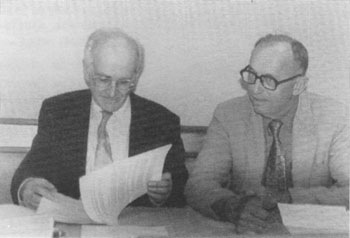
Dr. Robert Faurisson (left) and Dr. Robert Countess at the special IHR meeting in suburban Washington, DC, April 21, 1993.
Robert Faurisson, a university professor with an established reputation in French literature, has for several decades now carried out research on every aspect of the Holocaust story. His numerous meticulously researched articles on aspects of the Holocaust issue have led to a series of draining trials and physical attacks in France, including a nearly fatal beating in 1990. More than anyone, he inspired France's repressive July 1990 law criminalizing challenges to the factuality of the Holocaust story. He has audaciously challenged the Holocaust lobby in Sweden, Canada, and in French courts.
Dr. Faurisson will lecture on the significance of the documents on Auschwitz and other German camps that have recently emerged after years of suppression from Moscow archives. He will explain how French researcher Jean-Claude Pressac has misrepresented many of these documents in his much-discussed recent book.
English historian David Irving will bring attendees up to date on his startling discoveries about the “Final Solution” and other key historical issues from the complete diaries of Hitler's propaganda chief Joseph Goebbels. Irving, who played a major role in bringing these long-suppressed diaries to light, will also brief attendees on the increasingly frantic global campaign to muzzle him (and other Holocaust revisionists), whether by attempting to deny him entry to Australia and Italy, by convicting him for his revisionist views in Germany, or by pressuring bookstores in Britain that sell his works by vandalism and boycott. Irving, one of the world's most prolific and bestselling historians, is author of such acclaimed works as The Destruction of Dresden, Hitler's War, The Trail of the Fox, and Uprising!.
Scholars
Professor H. W. Koch, an internationally recognized specialist of German history who teaches at the University of York (England), will speak on the origins of the Second World War. He is the author of numerous scholarly articles and several books, including A History of Prussia, Hitler Youth: Origins and Development 1922-1945 and A Constitutional History of Germany in the 19th and 20th Centuries. He is also editor of and contributor to Aspects of the Third Reich, a 611-page quasi-revisionist anthology (published in 1985 by St. Martin's Press). With his impressive mastery of German history and his courageous engagement for historical truth, Dr. Koch's lecture should be particularly memorable.
Anthony Martin, Professor of Africana studies at Wellesley College (Massachusetts), will describe the storm of controversy that was set off because he included readings on the Jewish involvement in the trans-Atlantic slave trade in his survey course on African-American history. His “response to the unprincipled attacks, defamatory statements, assaults on my livelihood and physical threats” was a book, The Jewish Onslaught: Despatches from the Wellesley Battlefront, which has been selling briskly. A widely recognized specialist of African American history, Dr. Martin has authored or compiled and edited eleven books.
Michael Shermer, Adjunct Assistant Professor of History of Science at Occidental College in Los Angeles, appeared with David Cole on the recent “Donahue Show” broadcast devoted to Holocaust revisionism. Shermer is editor of Skeptic magazine, which counts prominent historians and educators among its readership. In an editorial in issue No. 2, 1993, he wrote: “I believe that skeptics should investigate the Holocaust revisionists. By 'investigate' I mean doing a rational skeptical analysis of their claims and the evidence for them… It is time to move beyond name calling and lay the evidence out on the table.” Shermer plans to devote considerable space to Holocaust revisionism in forthcoming issues of Skeptic.
Because Shermer has been critical of the revisionist view, his proposal to speak at the IHR Conference was accepted with some hesitation. It was felt, though, that attendees would appreciate an opportunity to hear this non-revisionist present his case, and perhaps witness a lively exchange of thoughtful views.
John Ball, a mineral exploration geologist from British Columbia, will speak about his research and professional evaluation of wartime aerial photography, providing devastating new insights into the suppressed history of Auschwitz and other alleged German death camps. Ball has gathered, studied, and published scores of long suppressed aerial reconnaissance photographs of Auschwitz, Treblinka, Belzec, Majdanek, Sobibor, and other German camps. His expert analysis of these wartime photos sheds new light on what actually did and didn't happen at these camps, providing valuable new data and insights against the Holocaust extermination story. Ball will illustrate his presentation with slides of wartime aerial photos, including some of the Plaszow camp, which featured prominently in Spielberg's “Schindler's List.” Ball will expose numerous factual lies of the widely-acclaimed movie.
Fred Leuchter is America's foremost expert on the design and operation of execution hardware, and the author of the history-making technical study that demolishes the Auschwitz gassing myth. He will update conference guests on his ordeal last fall at the hands of German “Justice,” and on the trial that awaits him in Germany for daring to speak openly about his history-making forensic investigation of alleged “gas chambers.”
No American has suffered more as a result of his dissident views on the Holocaust story. Because he has refused to lie under oath about his professional on-site investigation of the Auschwitz “gas chambers,” he lost his livelihood and was dragged to court to face criminal charges in the United States, and then was arrested last fall and cast into jail for a month in Germany for violating that nation's absurd law criminalizing dissenting views about the Auschwitz extermination story.
Activists
Bradley Smith, longtime head of IHR's Media Project and director of the Committee for Open Debate on the Holocaust (CODOH), will share his experiences in defying ADL censorship to bring revisionist facts and arguments to hundreds of thousands of students and professors as part of his highly successful Campus Project. He will speak about his headline-making campaign to place revisionist advertisements in scores of student papers across America.
Since the IHR's last Conference, Smith has become something of a national media celebrity. In addition to numerous appearances as a guest on radio talk shows, Smith has appeared as a guest on the “Donahue Show,” was featured on CBS's “48 Hours” and appeared on “60 Minutes.” Moreover, he was the subject of nationally broadcast discussions by the likes of Pat Buchanan and Gordon Liddy, and of major articles in Time, The New York Times, and of Newsday and of columns by journalists such as syndicated columnist William Buckley and the Washington Post's Richard Cohen.
And why not? As attendees at past conferences know, Bradley is as personable as he is effective, and the public appearance of this playwright, memoirist, former merchant seaman, deputy sheriff, and combat infantryman are always rich in anecdote, insight and information.
David Cole, an increasingly effective voice for Holocaust revisionism, returns to preview his promising second video on alleged wartime German killing facilities, “The Gas Chambers: A Look at the Physical Evidence.” Last year, in association with Smith, he produced the blockbuster video “Cole Interviews Dr. Franciszek Piper,” in which the curator of the Auschwitz State Museum admits on film that the “gas chamber” shown to tourists there is actually a postwar reconstruction. (So effective is this video that Israeli Holocaust historian Yehuda Bauer described it as “powerful.”)
This youthful Jewish filmmaker has also proven himself an effective spokesman for the revisionist view in television appearances on the “Donahue,” “Montel Williams,” and “Morton Downey” shows, as well as a memorable speaker, as he proved at IHR's Eleventh Conference.
IHR Editorial Advisor Dr. Robert Countess, an ordained minister as well as a former college-level instructor in history, will update attendees on his wide-ranging activism since the Eleventh Conference.
For security reasons, we cannot yet reveal the identity of this year's Mystery Speaker, except to state that he is a highly qualified technician from Europe whose study of the alleged mass-murder “gas chambers” at Auschwitz confirms that these facilities were not and could not have been used to kill people as claimed. His dramatic findings corroborate and strengthen the findings ofthe Institute of Forensic Research in Krakow (Poland) and of Leuchter and other qualified investigators.
“Mystery speakers” at previous IHR conferences have included Pulitzer prize-winning American historian John Toland, German combat veteran and historian General Otto Ernst Remer, and Wolf-Rüdiger Hess, son of the Third Reich's Deputy Führer.
IHR Staff
As usual, IHR staff members will feature prominently on the rostrum.
Serving as Master of Ceremonies this year will be Greg Raven, Associate Editor of the IHR Journal. He has devoted his considerable writing, editing, and computer skills to virtually every aspect of the IHR's work since he began work here in September 1992.
Journal Editor Mark Weber will once again deliver the keynote address, summing up IHR and revisionism's achievements since the previous conference, and outlining present and future challenges. Weber will share with attendees his own considerable recent experiences.
IHR editor Ted O'Keefe will dedicate the Twelfth Conference to the memory of the late American historian and journalist, William Henry Chamberlin. Chamberlin is perhaps best known to contemporary revisionists for his America's Second Crusade, a critical history of America's involvement and role in the Second World War. His three-volume history of the Russian Revolution is still a standard work. As a reporter for the Christian Science Monitor in the 1930s, Chamberlin was one of the few journalists to accurately report on the contrived Soviet famine in Russia and Ukraine.
Institute Director Tom Marcellus will report to conference attendees on IHR business and organizational development since the Eleventh Conference in 1992, including the background and current situation arising from the termination last September of the IHR's association with Willis Carto.
Growing Impact
In the period since the IHR's very successful Eleventh Conference in October 1992, historical revisionism – and in particular the branch that seeks to determine the facts about the so-called “Holocaust” – has become widely known across America and around the world. Spearheaded by the Institute for Historical Review, the persistent efforts of revisionists around the world to research and publicize suppressed facts about key chapters of twentieth century history – often at great personal cost, as readers of this Journal well know – have at last established a permanent media beachhead.
Television, radio, the print media are now coming to us – and while their coverage continues to be overwhelmingly hostile and often grotesquely distorted, the fact of Holocaust revisionism has lodged itself irrevocably in the public consciousness. And, as recent opinion polls suggest, a large and growing number of Americans have begun to doubt the orthodox Holocaust extermination story – in spite of a relentless Holocaust media campaign.
The courage and perseverance of revisionist scholars and publicists in achieving this recent breakthrough has brought an important policy change within the Holocaust Lobby. After years of superciliously pretending to ignore revisionists' scholarly findings, while entrusting the job of destroying revisionism to Zionist watchdogs such as the ADL in the United States, and to courts and police abroad, the Lobby's spokesmen have at long last been forced to attempt to answer revisionist arguments directly. One sign of this development has been the appearance, to predictable media hosannas, of Deborah Lipstadt's Denying the Holocaust (reviewed in the Nov.-Dec. 1993 Journal), as well as of Jean-Claude Pressac's book-length responses to revisionist research. This shift – from blackout to “exposure” to attempted refutation – is also manifest in many of the recent newspaper and magazine articles dealing with various aspects of the Holocaust story, including much of the publicity for the US Holocaust Memorial Museum, and for Spielberg's “Schindler's List.”
Smears and Legal Repression
Despite the success of the IHR and its allies in publicizing the results of revisionist scholarship, and in pressing the Holocaust Lobby onto the defensive, revisionists remain the targets of a formidable array of repressive laws and practices in several countries. Laws preventing revisionists' freedom of speech and expression, their exclusion from various countries, and the failure of authorities to punish physical attacks against of revisionists – all these remain a hard, oppressive reality with which revisionist researchers and publicists abroad must cope at great expense in time, money, and sometimes personal liberty. And yet, this persecution is a sure sign of progress because it underscores the essential weakness of the Holocaust edifice, and points up the fearful desperation of the traditional enemies of truth.
A Unique OpportunHy
As attendees of previous gatherings can attest, an IHR Conference is a unique event: uplifting, informative, and enjoyable. Nothing matches the opportunity to not only see and hear, but to meet personally and chat with revisionist scholars and activists from around the world, the men and women who, often at great personal cost, have led and continue to lead the world-wide crusade for truth about the most tabooed aspects of twentieth century history.
If you'd like to experience the thrill of historical discovery, the inspiration of selfless combat for historical truth, and the camaraderie of revisionists from around the world, plan to be there for IHR's Twelfth Conference.
Bibliographic information about this document: The Journal of Historical Review, vol. 14, no. 3 (May/June 1994), pp. 2-6
Other contributors to this document: n/a
Editor’s comments: n/a

